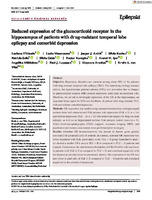Repositorio Digital
Reduced expression of the glucocorticoid receptor in the hippocampus of patients with drug-resistant temporal lobe epilepsy and comorbid depression
JavaScript is disabled for your browser. Some features of this site may not work without it.
Mostrar el registro sencillo del ítem
| dc.contributor.author | D’Alessio, Luciana | |
| dc.contributor.author | Mesarosova, Lucia | |
| dc.contributor.author | Anink, Jasper J. | |
| dc.contributor.author | Kochen, Silvia | |
| dc.contributor.author | Solís, Patricia | |
| dc.contributor.author | Oddo, Silvia | |
| dc.contributor.author | Konopka, Hector | |
| dc.contributor.author | Iyer, Anand M. | |
| dc.contributor.author | Mühlebner, Angelika | |
| dc.contributor.author | Lucassen, Paul J. | |
| dc.contributor.author | Aronica, Eleonora | |
| dc.contributor.author | Vliet, Erwin A.van | |
| dc.date.accessioned | 2023-03-29T13:11:38Z | |
| dc.date.available | 2023-03-29T13:11:38Z | |
| dc.date.issued | 2020-07-11 | |
| dc.identifier.citation | D’Alessio L, Mesarosova L, Anink JJ, et al. Reduced expression of the glucocorticoid receptor in the hippocampus of patients with drug-resistant temporal lobe epilepsy and comorbid depression. Epilepsia. 2020;61:1595–1605. https://doi.org/10.1111/epi.16598 | es_AR |
| dc.identifier.other | https://doi.org/10.1111/epi.16598 | |
| dc.identifier.uri | http://repositorio.hospitalelcruce.org/xmlui/handle/123456789/1352 | |
| dc.description | Fil: D’Alessio, Luciana Universidad de Buenos Aires, IBCN-CONICET, Centro de Epilepsia Hospital Ramos Mejía y Hospital El Cruce, ENyS-CONICET. Buenos Aires; Argentina | es |
| dc.description | Fil: Mesarosova, Lucia Amsterdam UMC, University of Amsterdam, Department of (Neuro) Pathology, Amsterdam Neuroscience. Amsterdam; the Netherlands | es |
| dc.description | Fil: Anink, Jasper J. Amsterdam UMC, University of Amsterdam, Department of (Neuro) Pathology, Amsterdam Neuroscience. Amsterdam; the Netherlands | es |
| dc.description | Fil: Kochen, Silvia Universidad de Buenos Aires, IBCN-CONICET, Centro de Epilepsia Hospital Ramos Mejía y Hospital El Cruce, ENyS-CONICET. Buenos Aires; Argentina | es |
| dc.description | Fil: Solís, Patricia Universidad de Buenos Aires, IBCN-CONICET, Centro de Epilepsia Hospital Ramos Mejía y Hospital El Cruce, ENyS-CONICET. Buenos Aires; Argentina | es |
| dc.description | Fil: Oddo, Silvia Universidad de Buenos Aires, IBCN-CONICET, Centro de Epilepsia Hospital Ramos Mejía y Hospital El Cruce, ENyS-CONICET. Buenos Aires; Argentina | es |
| dc.description | Fil: Konopka, Hector Universidad de Buenos Aires, IBCN-CONICET, Centro de Epilepsia Hospital Ramos Mejía y Hospital El Cruce, ENyS-CONICET. Buenos Aires; Argentina | es |
| dc.description | Fil: Iyer, Anand M. Amsterdam UMC, University of Amsterdam, Department of (Neuro) Pathology, Amsterdam Neuroscience. Amsterdam; the Netherlands | es |
| dc.description | Fil: Mühlebner, Angelika Amsterdam UMC, University of Amsterdam, Department of (Neuro) Pathology, Amsterdam Neuroscience. Amsterdam; the Netherlands | es |
| dc.description | Fil: Lucassen, Paul J. Swammerdam Institute for Life Sciences, Center for Neuroscience, University of Amsterdam. Amsterdam; the Netherlands | es |
| dc.description | Fil: Aronica, Eleonora Amsterdam UMC, University of Amsterdam, Department of (Neuro) Pathology, Amsterdam Neuroscience. Amsterdam; the Netherlands | es |
| dc.description | Fil: Vliet, Erwin A.van Amsterdam UMC, University of Amsterdam, Department of (Neuro) Pathology, Amsterdam Neuroscience. Amsterdam; the Netherlands | es |
| dc.description.abstract | Depressive disorders are common among about 50% of the patients with drug-resistant temporal lobe epilepsy (TLE). The underlying etiology remains elusive, but hypothalamus-pituitary-adrenal (HPA) axis activation due to changes in glucocorticoid receptor (GR) protein expression could play an important role. Therefore, we set out to investigate expression of the GR in the hippocampus, an important brain region for HPA axis feedback, of patients with drug-resistant TLE, with and without comorbid depression. Methods: GR expression was studied using immunohistochemistry on hippocampal sections from well-characterized TLE patients with depression (TLE + D, n = 14) and without depression (TLE − D, n = 12) who underwent surgery for drug-resistant epilepsy, as well as on hippocampal sections from autopsy control cases (n = 9). Video?electroencephalography (EEG), magnetic resonance imaging (MRI), and psychiatric and memory assessments were performed prior to surgery. Results: Abundant GR immunoreactivity was present in dentate gyrus granule cells and CA1 pyramidal cells of controls. In contrast, neuronal GR expression was lower in patients with TLE, particularly in the TLE + D group. Quantitative analysis showed a smaller GR+ area in TLE + D as compared to TLE − D patients and controls. Furthermore, the ratio between the number of GR+/NeuN+ cells was lower in patients with TLE + D as compared to TLE − D and correlated negatively with the depression severity based on psychiatric history. The expression of the GR was also lower in glial cells of TLE + D compared to TLE − D patients and correlated negatively to the severity of depression. Significance: Reduced hippocampal GR expression may be involved in the etiology of depression in patients with TLE and could constitute a biological marker of depression in these patients. | es_AR |
| dc.language.iso | en | es_AR |
| dc.relation.ispartofseries | Reduced expression of the glucocorticoid receptor in the hippocampus of patients with drug-resistant temporal lobe epilepsy and comorbid depression. Epilepsia. 2020;61:1595–1605 | |
| dc.subject | Depressive Disorder, Major | es_AR |
| dc.subject | Stress Disorders, Post-Traumatic | es_AR |
| dc.subject | Dysthymic Disorder | es_AR |
| dc.title | Reduced expression of the glucocorticoid receptor in the hippocampus of patients with drug-resistant temporal lobe epilepsy and comorbid depression | es_AR |
| dc.type | Article | es_AR |

